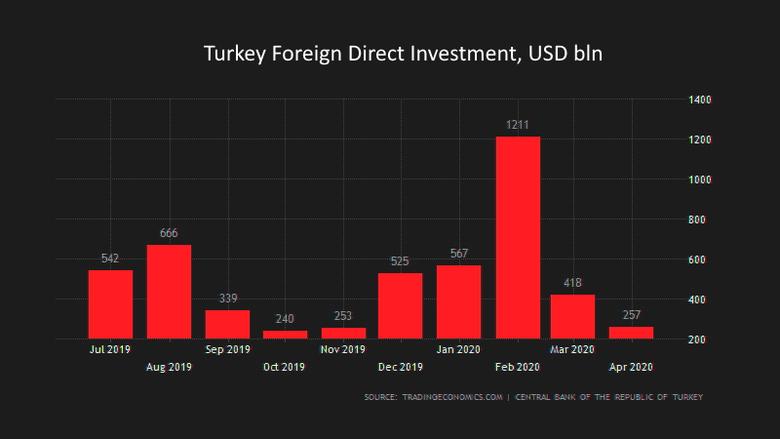
TURKEY'S FOREIGH INVESTMENT DOWN $8 BLN

AN - July 09, 2020 - Foreign capital is flooding out of Turkey in a massive vote of no confidence in President Recep Tayyip Erdogan's economic competence.
Overseas investors have withdrawn nearly $8 billion from Turkish stocks since January, according to Central Bank statistics, reducing foreign investment in the Istanbul stock exchange from $32.3 billion to $24.4 billion.
As recently as 2013, the figure was $82 billion, and foreign investors now own less than 50 percent of stocks for the first time in 16 years.
"Foreign investment has left Turkey for several reasons, both internal and external," Win Thin, global head of currency strategy at Brown Brothers Harriman, told Arab News.
"Externally, investors fled riskier assets like emerging markets during the height of the coronavirus pandemic. Some of those flows are returning, but investors are being much more discerning and Turkey does not seem so attractive."
In terms of internal factors, Thin said that Turkish policymakers had made it hard for foreign investors to transact in Turkey. "This includes real money clients, not just speculative.
"By implementing ad hoc measures to try and limit speculative activity, Turkey has made it hard for real money as well. Besides these problems, Turkey's fundamentals remain poor compared to much of the emerging markets."
Erdogan allies claim international players are manipulating the Istanbul stock exchange through automated trading, and have demanded action to make it difficult for them to trade in Turkish assets.
Goldman Sachs, JPMorgan, Merrill Lynch, Barclays and Credit Suisse were banned this month from short-selling stocks for up to three months, and this year local lenders were briefly banned by the banking regulator from trading in Turkish lira with Citigroup, BNP Paribas and UBS
JPMorgan was investigated by Turkish authorities last year after the bank published a report that advised its clients to short sell the Turkish lira.
MSCI, the provider of research-based indexes and analytics, warned last month that it may relegate Turkey from emerging market status to frontier-market status because of bans on short selling and stock lending.
With the market becoming less transparent, overseas fund managers, especially with short-term portfolios, are unenthusiastic about the Turkish market and are becoming more concerned about any forthcoming introduction of other liquidity restrictions.
The exodus of foreign capital is likely to undermine Turkey's drive for economic growth, especially during the coronavirus pandemic when employment and investment levels have gone down, with the Turkish lira facing serious volatility.
-----








